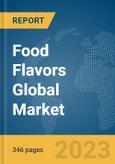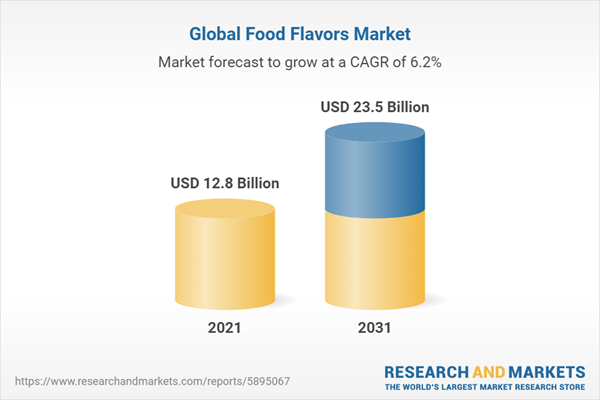The global food flavors market reached a value of nearly $12,817.0 million in 2022, having grown at a compound annual growth rate (CAGR) of 3.5% since 2017. The market is expected to grow from $12,817.0 million in 2022 to $17,371.3 million in 2027 at a rate of 6.3%. The market is then expected to grow at a CAGR of 6.2% from 2027 and reach $23,460.9 million in 2032.
Growth in the historic period resulted from strong economic growth in emerging markets, increasing consumer awareness regarding natural food flavors and rise in demand for processed foods. Factors that negatively affected growth in the historic period were the COVID-19 impact, shortage of skilled labor and geo-political tensions.
Going forward, increasing government support, rising demand for food products and increasing demand from the fast food industry will drive the growth. Factors that could hinder the growth of the food flavors market in the future include the Russia-Ukraine war impact and the rising interest rates.
The food flavors market is segmented by type into chocolate and brown, vanilla, fruit and nut, dairy type, spices and savory and other types. The fruit and nut market was the largest segment of the food flavors market segmented by type, accounting for 27.9% of the total in 2022. Going forward, the vanilla segment is expected to be the fastest growing segment in the food flavors market segmented by type, at a CAGR of 6.5% during 2022-2027.
The food flavors market is segmented by origin into natural and synthetic. The synthetic market was the largest segment of the food flavors market segmented by origin, accounting for 57.1% of the total in 2022. Going forward, the natural segment is expected to be the fastest growing segment in the food flavors market segmented by origin, at a CAGR of 6.5% during 2022-2027.
The food flavors market is segmented by application into dairy, bakery, confectionery, snack, beverage and other applications. The beverage market was the largest segment of the food flavors market segmented by application, accounting for 39.4% of the total in 2022. Going forward, the beverage segment is expected to be the fastest growing segment in the food flavors market segmented by application, at a CAGR of 6.5% during 2022-2027.
The food flavors market is segmented by form into powder and liquid. The liquid market was the largest segment of the food flavors market segmented by form, accounting for 59.0% of the total in 2022. Going forward, the liquid segment is expected to be the fastest growing segment in the food flavors market segmented by form, at a CAGR of 6.3% during 2022-2027.
Asia-Pacific was the largest region in the food flavors market, accounting for 38.1% of the total in 2022. It was followed by North America, and then the other regions. Going forward, the fastest-growing regions in the food flavors market will be Asia Pacific and North America where growth will be at CAGRs of 7.4% and 6.3% respectively. These will be followed by Western Europe and South America where the markets are expected to grow at CAGRs of 5.6% and 5.3% respectively.
The global food flavors market is fairly concentrated, with large players operating in the market. The top ten competitors in the market made up to 30.07% of the total market in 2021. International Flavors & Fragrances Inc was the largest competitor with 8.33% share of the market, followed by Givaudan with 4.88%, Kerry Group Plc with 2.79%, Sensient Technologies Corporation with 2.68%, Archer-Daniels-Midland Co with 2.65%, Takasago International Corporation with 2.42%, Ajinomoto Co., Inc with 2.00%, BASF SE with 1.90%, Symrise AG with 1.37%, and Koninklijke DSM NV with 1.04%.
The top opportunities in the food flavors market segmented by type will arise in the fruit and nut segment, which will gain $1,278.0 million of global annual sales by 2027. The top opportunities in the food flavors market segmented by origin will arise in the synthetic segment, which will gain $2,531.4 million of global annual sales by 2027. The top opportunities in the food flavors market segmented by application will arise in the beverage segment, which will gain $1,873.5 million of global annual sales by 2027. The top opportunities in the food flavors market segmented by form will arise in the liquid segment, which will gain $2,699.3 million of global annual sales by 2027. The food flavors market size will gain the most in China at $1,199.9 million.
Market-trend-based strategies for the food flavors market include increasing investments, product innovations, launches of innovative snack flavors, focusing on artificial intelligence for optimizing food and flavor formulation, technology advancements and strategic partnerships and collaborations.
Player-adopted strategies in the food flavors market include focus on strengthening business capabilities through business expansion and enhancing operational and business capabilities through strategic partnerships and collaborations.
To take advantage of the opportunities, the analyst recommends the food flavors companies to focus on natural food flavors, focus on technological advancements, focus on product innovations, expand in emerging markets, continue to focus on developed markets, focus on partnerships and collaborations, provide competitively priced offerings, continue to use B2B promotions, focus on online marketing, and continue to focus on fast-growing applications.
Table of Contents
Executive Summary
Food Flavors Global Market Opportunities And Strategies To 2032 provides the strategists; marketers and senior management with the critical information they need to assess the global food flavors market as it emerges from the COVID-19 shut down.Reasons to Purchase
- Gain a truly global perspective with the most comprehensive report available on this market covering 12 geographies.
- Understand how the market is being affected by the coronavirus and how it is likely to emerge and grow as the impact of the virus abates.
- Create regional and country strategies on the basis of local data and analysis.
- Identify growth segments for investment.
- Outperform competitors using forecast data and the drivers and trends shaping the market.
- Understand customers based on the latest market research findings.
- Benchmark performance against key competitors.
- Utilize the relationships between key data sets for superior strategizing.
- Suitable for supporting your internal and external presentations with reliable high-quality data and analysis
Description:
Where is the largest and fastest growing market for food flavors market? How does the market relate to the overall economy, demography and other similar markets? What forces will shape the market going forward? The food flavors market global report answers all these questions and many more.The report covers market characteristics; size and growth; segmentation; regional and country breakdowns; competitive landscape; market shares; trends and strategies for this market. It traces the market’s historic and forecast market growth by geography. It places the market within the context of the wider food flavors market; and compares it with other markets.
The report covers the following chapters
- Introduction and Market Characteristics - Brief introduction to the segmentations covered in the market, definitions and explanations about the food flavors market.
- Key Trends - Highlights the major trends shaping the global food flavors market. This section also highlights likely future developments in the market.
- Global Market Size and Growth - Global historic (2017-2022) and forecast (2022-2027, 2032F) market values, and drivers and restraints that support and control the growth of the market in the historic and forecast periods.
- Regional and Country Analysis - Historic (2017-2022) and forecast (2022-2027, 2032F) market values and growth and market share comparison by region and country.
- Market Segmentation - Contains the market values (2017-2022) (2022-2027, 2032) and analysis for each segment by type, by origin, by application, and by form in the market.
- Regional Market Size and Growth - Regional market size (2022, historic (2017-2022) and forecast (2022-2027, 2032F) market values, and growth and market share comparison of countries within the region. This report includes information on all the regions Asia-Pacific, Western Europe, Eastern Europe, North America, South America, Middle East and Africa and major countries within each region.
- Competitive Landscape - Details on the competitive landscape of the market, estimated market shares and company profiles of the leading players.
- Key Mergers and Acquisitions - Information on recent mergers and acquisitions in the market covered in the report. This section gives key financial details of mergers and acquisitions, which have shaped the market in recent years.
- Market Opportunities And Strategies - Describes market opportunities and strategies based on findings of the research, with information on growth opportunities across countries, segments and strategies to be followed in those markets.
- Conclusions And Recommendations - Includes recommendations for food flavors providers in terms of product/service offerings, geographic expansion, marketing strategies and target groups.
- Appendix - This section includes details on the NAICS codes covered, abbreviations and currencies codes used in this report
Scope
Markets Covered:
1) By Type: Chocolate And Brown; Vanilla; Fruit And Nut; Dairy Type; Spices And Savory; Other Types2) By Origin: Natural; Synthetic
3) By Application: Dairy; Bakery; Confectionery; Snack; Beverage; Other Applications
4) By Form: Powder; Liquid
Companies Mentioned: International Flavors & Fragrances Inc; Givaudan; Kerry Group Plc; Sensient Technologies Corporation; Archer-Daniels-Midland Co
Countries: Australia; China; India; Indonesia; Japan; South Korea; USA; Brazil; France; Germany; UK; Russia
Regions: Asia-Pacific; Western Europe; Eastern Europe; North America; South America; Middle East; Africa
Time series: Five years historic and ten years forecast.
Data: Ratios of market size and growth to related markets; GDP proportions; expenditure per capita; food flavors indicators comparison.
Data segmentations: country and regional historic and forecast data; market share of competitors; market segments.
Sourcing and Referencing: Data and analysis throughout the report is sourced using end notes.
Companies Mentioned
- International Flavors & Fragrances Inc
- Givaudan
- Kerry Group Plc
- Sensient Technologies Corporation
- Archer-Daniels-Midland Co
- Takasago International Corporation
- Ajinomoto Co., Inc
- BASF SE
- Symrise AG
- Koninklijke DSM NV
- Jining Nature Group
- Nanchang Duomei Bio-Tech Co., Ltd
- Gangyang Flavor-chemistry Co.,Ltd
- Shandong Tianbo Food Ingredients Co., Ltd
- Robin Chemicals Ltd
- Agilex Flavors & Fragrances Pvt. Ltd
- Create Flavors
- Flavourworks
- Nestle
- Metarom
- International Flavors & Fragrances (Poland) Sp. z o.o.
- Aromatique Food SRL
- FlavorSum, LLC
- Meridian Flavors, Inc
- T. Hasegawa USA Inc
- Bell Flavors and Fragrances
- Firmenich SA
- ARSTE FI
- Ars Technica
- Ingredion Incorporated
- First Choice Ingredients
- Afribon
- AJWA Group Food Industries
Table Information
| Report Attribute | Details |
|---|---|
| No. of Pages | 346 |
| Published | October 2023 |
| Forecast Period | 2021 - 2031 |
| Estimated Market Value ( USD | $ 12.8 Billion |
| Forecasted Market Value ( USD | $ 23.5 Billion |
| Compound Annual Growth Rate | 6.2% |
| Regions Covered | Global |
| No. of Companies Mentioned | 33 |









